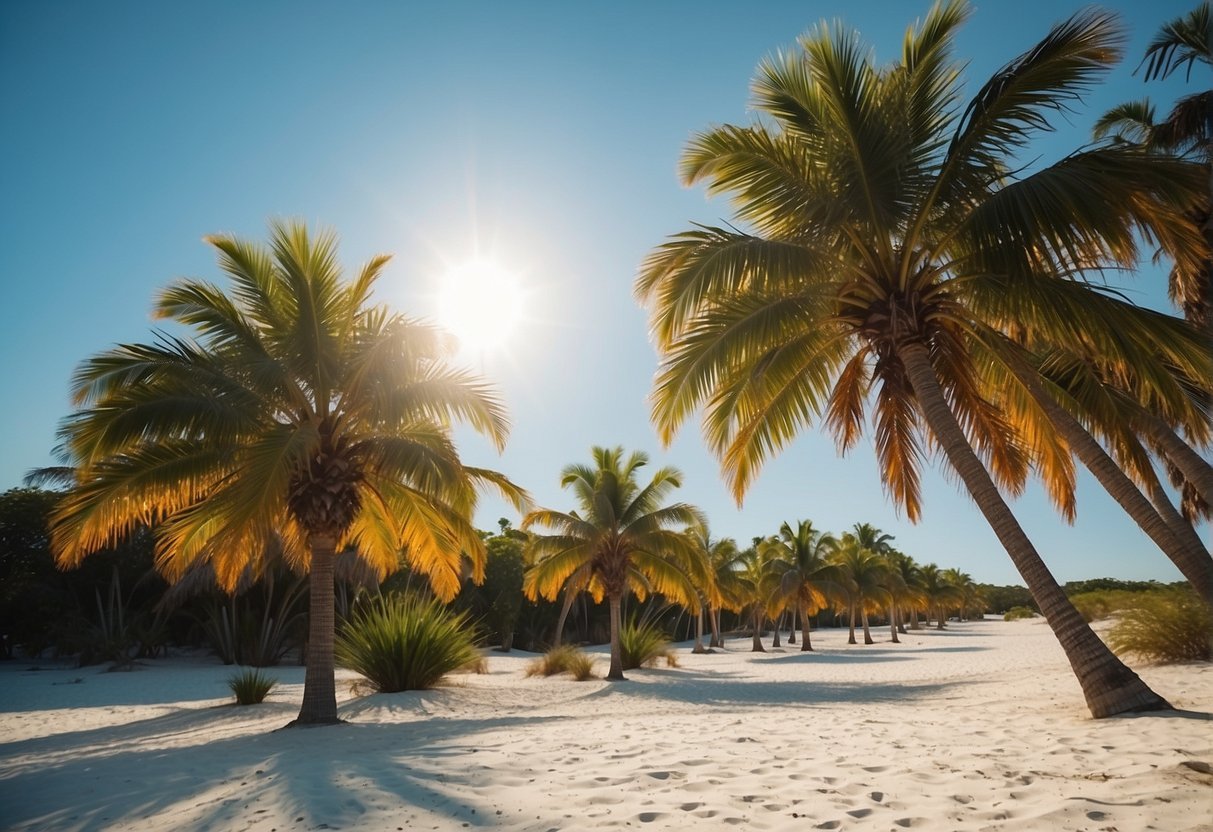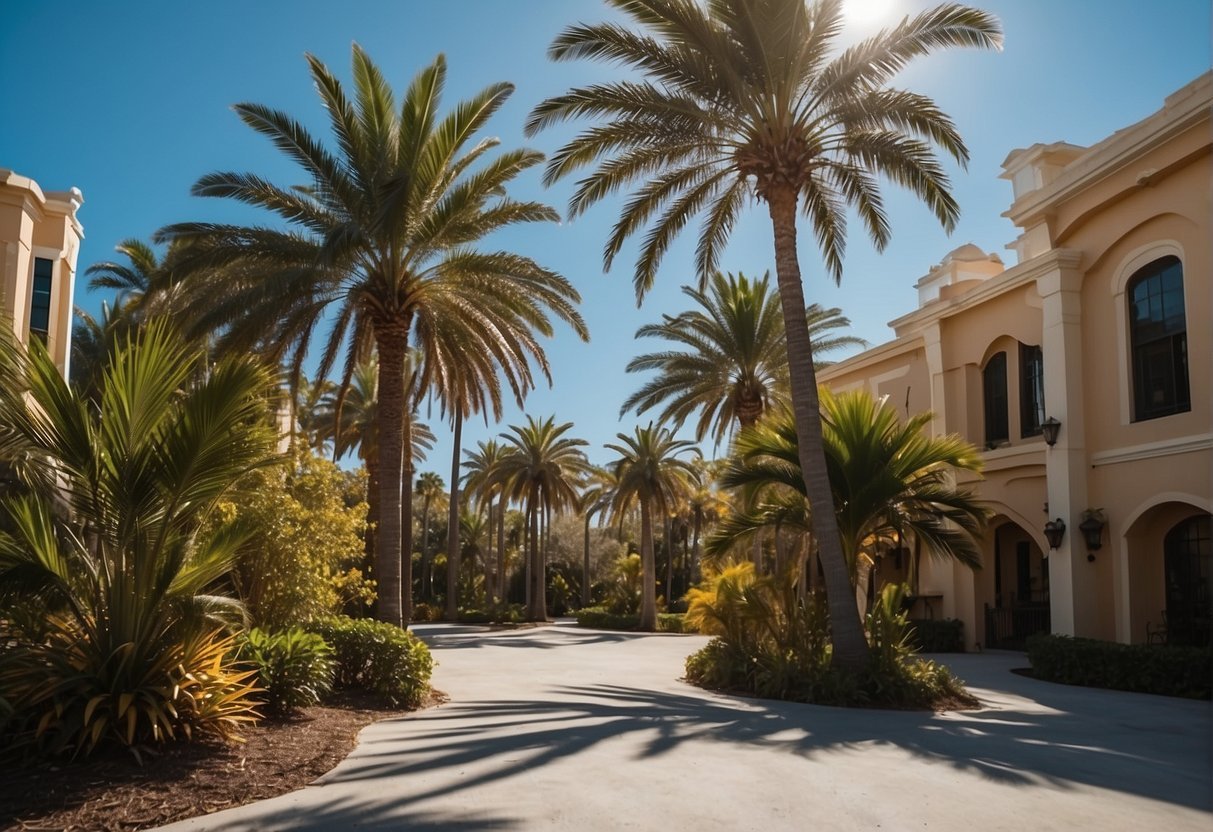游览佛罗里达州的最佳时间 - 阳光之州季节性指南
Florida, renowned for its year-round warmth and abundant sunshine, offers travellers diverse attractions, from pristine beaches to bustling theme parks.
Deciding the best time to visit depends largely on what you envisage for your holiday. Those longing for beach time might target periods of optimum weather, while visitors drawn to cultural events or quieter experiences may find off-peak months more appealing.

The state’s climate varies considerably from the balmy Keys to the more temperate northern regions, influencing travel plans. Seasonal festivities and regional highlights also play a role in timing your trip. For instance, the cooler winter months offer comfortable exploration in the south. At the same time, summer tends to be ideal for water-based activities in the north despite the likelihood of afternoon showers.
Considering the subtropical to tropical climate, regional variations, and seasonal events can entirely shape your Florida experience. Whether you’re seeking the perfect beach day, eager to evade the crowds, or hunting for the best deals, timing your visit can make all the difference.
Best Time to Visit Florida – Key Takeaways
- Ideal visit times vary based on desired activities and climate preferences.
- Seasonal and regional aspects are significant when planning your trip.
- Off-peak periods may offer fewer crowds and potential savings.
Overview of Florida’s Climate

The Seasons of Florida
Florida experiences a range of climatic conditions throughout the year, broadly categorised into four seasons:
- 春天: Characterised by warm temperatures with an average of 22°C to 28°C.
- 夏天: Known for its hot and humid weather, temperatures frequently rise above 32°C.
- Fall: Milder temperatures prevail, making it one of the more comfortable times to visit.
- 冬天: Cooler and drier weather, with temperatures in the south averaging around 20°C to 25°C.
Humidity and Rainfall Patterns
- Humidity: Florida is notorious for its high humidity levels, particularly during summer.
- Rainfall: The summer is also the rainy season, with frequent afternoon thunderstorms, whereas the winter months are comparatively dry.
Extreme Weather Phenomena
- Hurricanes: The hurricane season lasts from June to November, with the highest likelihood of storms from August to October.
- Heatwaves: Occasionally, heatwaves can elevate temperatures further, especially in inland areas.
阳光
Florida’s nickname is the ‘Sunshine State’ thanks to the abundant sunshine it receives year-round, making it a favoured destination for visitors seeking warmth and light.
- Sunshine Duration: Florida averages 7-8 hours of sunshine per day in the winter and up to 11 hours in the summer.
Remember to check the local weather and climate conditions before planning your trip, as weather patterns can vary, especially in a state as large as Florida.
Optimal Travel Times by Season
Florida’s diverse seasons offer distinct advantages for your travel plans, whether you’re seeking the sun-soaked beaches or the world-famous theme parks. The following will help you decide the most suitable time to pack your bags for the Sunshine State.
Winter in Florida
- 十二月至二月:
Escape the cold and find solace in Florida’s mild winters. January and February are part of the high season when snowbirds flock south, leading to busier attractions and higher prices. - Theme Park Visits:
Post-holiday crowds in January are thinner, making it an excellent time to visit theme parks.
Spring Visits
- 三月至五月:
Temperatures are comfortably warm and perfect for beach vacations or exploring the state. Spring break can see increased crowds, particularly in March. - Travel Rates:
April and May offer the best balance of pleasant weather and value before the summer peak begins.
Summer Travel
- 六月至八月:
Expect high temperatures, humidity, and the start of the hurricane season in June. While July and August remain popular, this is when Florida’s weather is most volatile. - 人群:
Theme parks are busiest during summer, especially around July 4th—book in advance to manage costs and availability.
Autumn Escapes
- 九月至十一月:
These months are part of the shoulder season, offering fewer crowds and often lower travel costs. September still carries the risk of hurricanes. - 天气:
By October and November, the climate becomes milder, making it a pleasant time for travel before the winter high season returns.
Remember to check for specific school vacation dates, which can significantly affect crowd levels and rates. Always plan to secure the best deals, and if you’re travelling for theme parks or beaches, time your visit to dodge the peak crowds and hurricane season.
Regional Considerations for Your Trip
When planning your visit to Florida, it’s essential to recognise that the state’s diverse regions offer unique experiences at different times of the year.
The Panhandle and Northern Florida
- Destin and Pensacola: These Panhandle cities are renowned for their beautiful beaches and typically offer cooler temperatures than Southern Florida. They present optimal conditions in the spring and autumn months, attracting fewer visitors and providing a more relaxed atmosphere.
- Best for Beaches: March to May, September to October
- Jacksonville and St. Augustine: Rich in history and culture, these cities are ideal to visit in late spring or early autumn when the weather is mild and there’s lower humidity.
- Museum and Outdoor Activities: Best enjoyed from April to June and September to November
Central Florida’s Attractions
- Orlando and Theme Parks: This region is a world-famous destination for its theme parks. To avoid long queues and hot weather, consider visiting in the cooler months from January to April.
- Theme Park Visits: January to April for milder weather and smaller crowds.
- Tampa and Daytona: The best times for motorsports fans and those seeking vibrant city life are outside peak tourist seasons, in spring and autumn.
- Events and City Tours: Opt for March to May and October to November.
South Florida and the Keys
- Miami, Fort Lauderdale, and Miami Beach: For those looking for vibrant nightlife and cultural experiences, the best weather is in the winter to early spring, when the climate is less humid.
- Cultural Festivals: The prime time is between November and April.
- The Everglades, Naples, and Fort Myers: These nature-rich areas are best visited during the dry season, which runs from November to March, to experience the wildlife without the summer’s excessive heat.
- 自然和野生动物: November to March for optimal conditions.
- The Florida Keys and Key West: If you want to dive into the ocean’s depths or relax by the shore, the winter and early spring months promise the most favourable weather, with warm days and cool evenings.
- Water Activities: Best scheduled from December to April.
Bullet points, lists, and bold formatting enhance readability following instructions. Short paragraphs are utilised for clarity and ease of reading, aiming to be especially useful for mobile users.
Special Events and Off-Peak Advantages
Festive Celebrations
Visiting Florida during special events offers unique experiences. Christmas at 华特迪士尼世界 transforms into a whimsical world of glittering lights and festive shows.
Off-Peak Pleasures
Travelling during off-peak times:
- Ensures lower prices, ideal for budget-conscious travellers.
- You can enjoy less crowded festivities such as Halloween Horror Nights with fewer queues and more personal space.
Optimal Seasonal Events
- 春假 is vibrant, with many 节日 and events catering to 家庭 和 游客.
- 夏天 entices visitors to Florida beaches.
自然景观
- 经验 大沼泽地国家公园 when it’s less humid and wildlife is abundant.
- State parks 靠近 坦帕 offer a peaceful retreat during quieter months.
You can explore Florida’s many attractions under favourable conditions by visiting during special events or off-peak seasons. Enjoy the 魔法王国 without the peak time hustle, relax on South Beach with extra space for your towel, and make the most of 沙滩 without navigating crowds of tourists. Plan wisely, and your vacation to the Sunshine State’s top tourist destinations can be memorable and comfortable.






